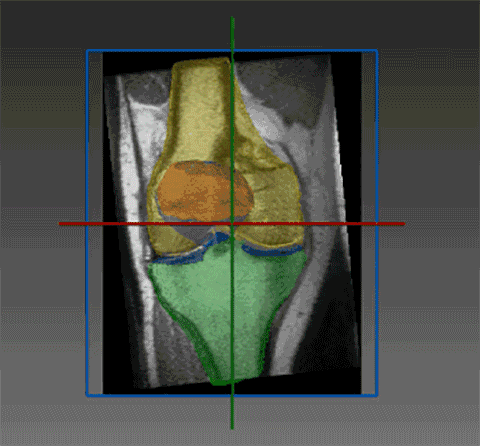RSIP Vision Announces New Tool for Sports Medicine Applications, Enabling Automated Assessment of Cartilage Damage
RSIP Vision Announces New Tool for Sports Medicine Applications, Enabling Automated Assessment of Cartilage Damage
This new algorithmic software provides automated measurement of articular cartilage in MRI scans, thereby improving evaluation of the integrity and extent of damaged cartilage while elevating diagnosis, treatment and recovery care options.
TEL AVIV, Israel & SAN JOSE, Calif.--(BUSINESS WIRE)--RSIP Vision, a clinically proven leader in real-world AI solutions for medical image analysis, announced today a new articular cartilage segmentation tool that delivers accurate, non-invasive and automatic assessment of chondral lesions in MRI scans. This new software module enables quick, precise, deep learning-based segmentation of joint cartilage from MRI scans of hips, knees, and ankles. RSIP Vision’s advanced medical imaging algorithms provide accurate measurement of the location, geometry and boundaries of osteochondral lesions in MRI images, which enable the physician to easily evaluate the extent of the damage, select the appropriate treatment and assess its efficacy.
Chondral lesions are particularly prevalent among young and active patients, including athletes. Due to the avascular nature of articular cartilage, the healing potential is limited. These lesions hinder the indispensable role that cartilage plays in creating a smooth, low-friction surface for transmission of forces across the joint. In many cases, chondral lesions limit the athlete’s ability to participate in sports – and can even affect their daily activities. Cartilage segmentation is a crucial solution that helps the physician choose the optimal treatment plan for the patient. To assist the physician’s assessment of the most suitable procedure from a variety of cartilage-sparing procedures (mosaicplasty, micro-fracture, osteochondral autograft transfer system, autologous chondrocyte implantation), the articular cartilage is imaged using an MRI, segmented and then evaluated for lesion size (diameter), shape and boundaries. Any viable cartilage in non-weightbearing areas is also mapped for possible cartilage transfer (such as mosaicplasty or OATS).
RSIP Vision has extensive experience and expertise in MRI segmentation of soft tissues, offering fully automated segmentations with submillimeter accuracy. The new module from RSIP Vision utilizes state-of-the-art deep learning (DL) algorithms designed to deal with MRI scans of cartilage in hip, knee, and ankle joints. Vendor-neutral and available to third-party MRI manufacturers and medical device vendors, this new solution enables physician operators an improved way to evaluate cartilage damage, select the optimal treatment option and follow-up postoperatively.
RSIP Vision’s new module is essential in sports medicine, where cartilage damage is a common and debilitating problem among athletes from all fields. Using RSIP Vision’s module, physicians can better evaluate the integrity of an athlete’s cartilage and provide the best fitting cartilage-sparing treatment, resulting in improved outcomes and shortened recuperation downtimes.
“It is very valuable to be able to accurately map chondral lesions preoperatively,” said Dr Shai Factor, an orthopedic surgeon at Tel Aviv Sourasky Medical Center in Israel. “Analysing the parameters of the lesion and its boundaries allows the surgeon, along with the patient, to choose the ideal cartilage repair technique. Additionally, in cases where cartilage transfer is the chosen option, this technology will make it possible to map the donor cartilage area, as well, and plan the surgery in the best way that will lead to better outcomes.”
About RSIP Vision
RSIP Vision is driving innovation in medical imaging through advanced AI and computer vision solutions. We’re a proven global leader, with more than 25 years of experience. Our multidisciplinary team of 50+ algorithm experts, computer science engineers, physicists, radiologists, echo specialists and in-house medical annotation teams, continue to provide innovative and effective solutions, as well as research and customized algorithm development to medical device companies to give them an edge over their competition. Our engineers are experts in artificial intelligence, deep learning and the most advanced computer vision techniques. They develop practical AI modules that ensure precision, reduce time to market, cut costs, and allow core R&D teams to focus on key initiatives while we provide custom-built solutions to fit their growing needs. Our aim is to drive innovation in medical imaging through our custom software and advanced algorithm development and custom technologies which can be found in medical devices in leading facilities worldwide, ensuring our customers remain at the forefront of the latest medical advances.
RSIP Vision is headquartered in Jerusalem, and has a U.S. office in San Jose, CA.
More information is available on the company website: www.rsipvision.com
Contacts
Nicole Rodrigues
NRPR Group
nicole@nrprgroup.com

